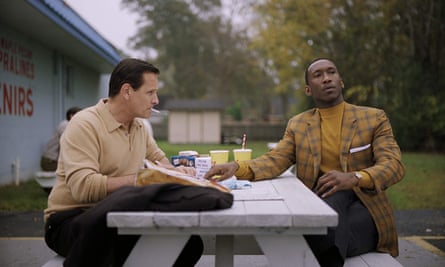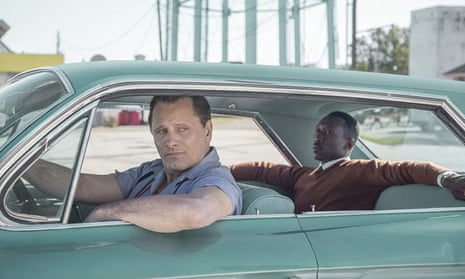There are many pleasures to be had in Peter Farrelly’s new film Green Book, perhaps not a great surprise when one remembers the unabashed joys of his previous work from Dumb and Dumber to There’s Something About Mary to his underrated remakes of Fever Pitch and The Heartbreak Kid. But it’s more of a shock given that the material edges him into more serious-minded fare than usual in telling the true story behind the friendship of renowned pianist Donald Shirley and his driver Tony Lip.
It’s 1962 and Tony (Viggo Mortensen) is in need of employment as the club he works at undergoes renovations while Donald (Mahershala Ali) is in need of a driver to take him through the deep south for an upcoming tour. He’s aware of the troubles that he might face in different locations due to the colour of his skin and requires someone to act as both staff and protector. Tony isn’t an obvious choice, he’s as rude as Donald is refined and his views on race are problematic to say the least, but he carries with him the muscle that Donald is sure he’ll need and so the two set off.
It’s easy to discount the simplicity of Green Book in a way that many similarly and unfairly did when Hidden Figures broke out in 2016, sighing at the broad strokes used to tell a vital true story. But there’s a necessity in using a film of this scale to recreate a time not too long ago when black people were being regularly dehumanised and devalued in ways that were upheld by the law. Yes, this is entertainment pitched at a wide audience and is constructed in the most easily digestible way possible but it still serves a significant purpose to remind white audiences of the difficulties faced by those of colour.
Early in the film, we’re shown that, while glossily presented, Farrelly, writing with actor-producer Brian Hayes Currie and Tony Lip’s son Nick Vallelonga, won’t be sugarcoating tensions of the time. In the first few minutes we see Tony use racial slurs when describing two black men working in his home before throwing out the glasses they were drinking from, a startling scene that sets up a character we then automatically reject as a result. It’s clear we’re on the road to redemption but it’s a slow process and as patronising as it might seem to those woke enough to not need such hand-holding, it’s crucial for someone like Tony to see firsthand the indignities faced by Donald.
The film is named after the guide used by black travellers between the 30s and 60s to avoid places that could lead to further trouble and to recommend safe lodging, and over two hours, it’s fairly relentless in its depiction of the everyday humiliations forced upon a black man at that time. There are hotels Donald can’t stay at, times of day he can’t be out at, bathrooms he can’t use and while for some it might be comforting to position these situations as something of the past, there’s a bleak prescience given the increase in reported instances of race-based discrimination in the past year. It’s unavoidably enraging but ultimately there’s a charm to seeing the men get closer and to see Tony reject the repellent views he once had. It’s a crowd-pleaser that will play well to a wide audience, a quality that’s often slightly limiting for some of the issues we’re presented with. There’s a revelation of sorts halfway through the film that adds an extra layer to Donald’s character but it’s handled with kid gloves, the muted references to it feeling sanitised later in the film.

There’s clearly a more nuanced drama to be made from this story but given the scale, there’s still a lot here to praise. It’s fun to see Mortensen go all in with what could have gone disastrously: a full-blooded comic character, complete with a gut and a thick Italian-American accent. He’s better than the trailer suggests, the performance feeling less like an impression and more like the lived-in portrayal of a larger-than-life man. Ali’s natural elegance and poise make him a perfect choice for the role and, in a just world, his collection of natty suits would earn a best costume design nomination come January. There’s a great poignancy in watching a man so dignified suffer through the trials presented in front of him and Ali’s face is frequently heartbreaking, conveying the hurt, quiet fury and disappointment at how he’s perceived by much of white America. While Mortensen’s role is the showier of the two, Ali’s stays with us longer.
Farrelly, so used to orchestrating extreme audience reactions with his comedies, shows that he’s equally adept with not just the funnier moments in Green Book but the quieter dramatic beats as well. Right through to the feelgood Christmas-set finale, there’s something about the film that feels primed to be a hit and while its race-switched take on Driving Miss Daisy might seem oversimplified for more refined audiences, there’s an importance to preaching beyond the choir.
Green Book is showing at the Toronto film festival and will be released in the US on 21 November and in the UK on 8 February
